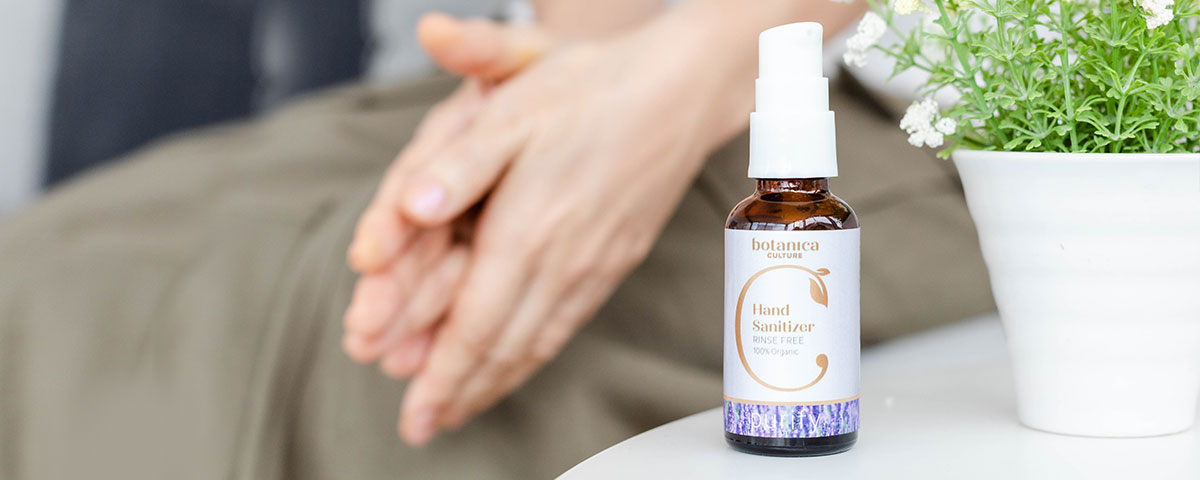The Hand Sanitiser Debate: Does Hand Sanitiser work without Alcohol?
Masks, hand washing and hand sanitiser. Who knew that these guys would be our constant companions? And with new, highly infectious Corona virus mutations on the rise, it looks like they will be with us for a while.
Nothing can beat a good 20-second hand washing with soap and water to kill Covid germs. But sometimes we have to make do with a few pumps of hand sanitiser.
Choosing a hand sanitiser
Most of us choose our hand sanitiser based on the price, smell, the feel on our skin. And how well it can blast germs out of existence
Usually, a hand sanitiser’s germ-killing power comes from its alcohol content. Alcohol certainly kills bacteria but using it frequently makes our hands dry and cracked as the alcohol strips the natural oil from the skin. People also worry about the long-term effects of using so much alcohol on the skin and how this might affect our overall health.
As the pandemic drags on and hand sanitising is here to stay, many are on the lookout for a less harsh way to banish germs and bacteria.
Which hand sanitiser is better: Alcohol-based or alcohol free?
There is no doubt that alcohol-based hand sanitisers blitz germs. However, the United States’ Centre for Disease Control has found that to be effective, a hand sanitiser must contain an alcohol concentration of 60–95%. This makes these formulations harsh and drying. Ironically, this cracked skin can be an entry point for germs and bacteria, and may lead to infection. Alcohol-based hand sanitisers also lose their protective properties once the alcohol dries up.
Another problem in assessing the effectiveness of alcohol-based sanitisers is the lack of a standardised ingredient list.
This danger was highlighted recently in Singapore when the country’s Health Sciences Authority recalled 18 hand sanitisers containing unsafe levels of methanol or acetaldehyde, a toxic chemical compound.
The list included household names such as Lifebuoy, Guardian, Cath Kidston and Walch. Alcohol sanitisers may be lethal to germs but at what cost to our overall wellness?
What about alcohol-free sanitisers?

Alcohol-free sanitisers seem more and more appealing. However, not all alcohol-free sanitisers are equally good. Some sanitisers replace alcohol with other harsh synthetic chemicals, so it is important to check the ingredients list. The active ingredients in some alcohol-free sanitisers only eliminate a narrow range of bacteria or viruses and this can also limit their effectiveness.
So, can we avoid using nasty chemicals on our skin and protect against a range of viruses, bacteria and fungi?
Botanica Culture’s Hand Sanitiser
A carefully formulated, plant-based, alcohol-free, organic hand sanitiser, it is effective in killing unwanted bacteria, viruses and fungi. Friendly to your skin, it is safe for children and has a pleasant smell and texture without being sticky or greasy. It is also completely free from artificial fragrances, colouring and synthetic chemicals.
Botanica Culture’s product developers painstakingly researched a range of essential oils and selected seven potent oils, all highly effective against germs and bacteria.
These essential oils embody all the “antis”; research shows that they have powerful anti-bacterial, anti-fungal, antiviral and antiseptic properties. They also work against a broad range of bacteria and viruses.
These super seven organic essential oils are:
Tea Tree oil Antibacterial and antifungal
Lavender oil Cleansing and antiseptic
Sweet Orange oil Contains a powerful antioxidant to fight free radicals
Lemongrass oil Anti-microbial and antibacterial
Eucalyptus oil Anti-inflammatory and healing
Thyme oil Antibacterial and antifungal
Cinnamon oil Germicidal and antiseptic
The blend also includes Witch hazel, Vitamin E and Aloe vera to soothe, moisturise and heal the skin. The botanical ingredients make this hand sanitiser safe for sensitive skin, free from the chemicals that can cause dryness or irritation.
Botanica Culture’s alcohol-free Hand Sanitiser also lasts longer than alcohol-based products, which tend to evaporate quickly, so there’s no need to reapply it as often. The light, fresh fragrance is a welcome contrast to the clinical smell of most hand sanitisers.
Along with our phones and wallets, it looks like our hand sanitiser and a mask will continue to be our must-have accessories. Why not use a sanitiser that kills germs without harming us in the process? And save the alcohol for when you treat yourself to a Friday happy-hour cocktail.




